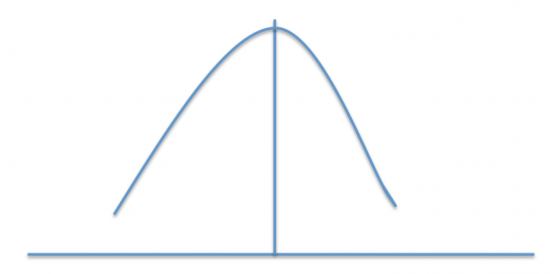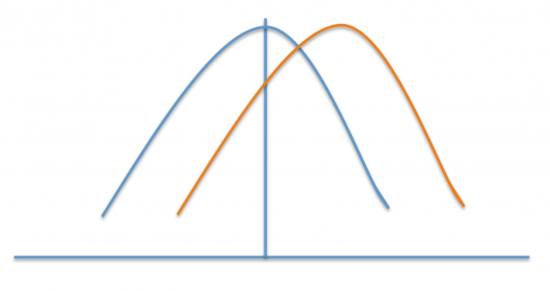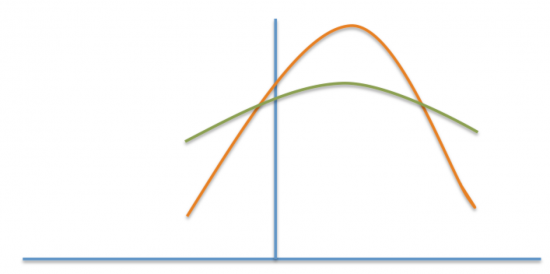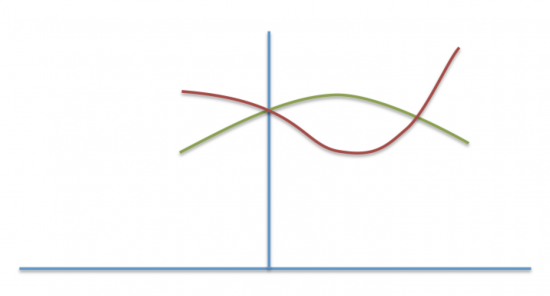It will come as no surprise to anyone that I think about the shape of politics. In a democracy I suspect that this should look something like this (don't worry too much about the absolutely precise shapes, these are Sunday morning doodles):
The X scale is from left to right: there is a mid point and that should broadly speaking be the most popular point, representing consensus.
Many people of my age would agree that in the last thirty years this mid point has shifted right (orange line, blue as before):
What was once the mid-point is now to the left of the consensus (you can argue whether I should re-position the vertical Y axis blue line: I have chosen not to or I could not make the point)
Something else has happened of late though. There is less agreement about the consensus. It has been suggested that the centre ground is having less appeal. Whether the cause is austerity or immigration the range of opinion has flattened: the consensus is harder to identify amongst a broader range of opinion (green line, orange as before):
I do not think that the only change though. The public may have broadened their range of opinion but amongst political activists the tendency to the mean has disappeared (red line, green as before):
The public (green line) may have broadened their views, but political activists (the red line) have abandoned the mean. On the left there has been a rise in left wing support, but with a marked group tending to the mean still existing in Labour, the Lib Dems and others. On the right the tendency to the old mean is in short supply, and the shift to extremes with the Conservatives and UKIP much more marked, evidenced by mass enthusiasm for Brexit.
I suggest a distribution, based on logic. Others will have a differing logic. The question is which if these trends is likely to prevail in the long term, given the tendency of human behaviour to converge on a mean? If I am right it would seem the left have greater prospect of emerging as the cause most likely to benefit in the long term: their overall message is closer to a past mean than the message of the right, and in aggregate more so now.
I suspect the political right are aware of this. It explains their enthusiasm for fundamental reforms to the NHS, education, trade, the EU, freedom of speech and politics itself. What they are seeking to embed is something against which they would expect a natural backlash in the normal course of events.
Out of power the left has to work out how to challenge that process and then reverse it if the shape of politics is not to be permanently changed by the contractual constraints being imposed upon it.
Thats the current shape of politics. And the consequences have enormous impact.
Thanks for reading this post.
You can share this post on social media of your choice by clicking these icons:
You can subscribe to this blog's daily email here.
And if you would like to support this blog you can, here:







Are you familiar with the Overton window? It looks to me like the left is already succeeding in moving the narrative to the left somewhat.
Assuming this is a standard left-right political spectrum (other axes are available) I’d suggest your fourth (red) line still needs to drop at either end – there are still relatively few out-and-out Communists or Anarcho-syndicalists, or Fascists, even among the political activists. But you could well be right that there is a bimodal distribution, clustered near the points where the main political parties lie.
I accept your point about dipping off at the extremes
Something I came across recently is an impressive effort to move the Overton Window where Falkirk was protesting against efforts to extract methane locally. The result was this rather impressive declaration
http://www.faug.org.uk/community_charter.pdf
– which has been dubbed, I think, the Falkirk Magna Carta (and appropriately, as our current rulers seem to hold the ruled in general contempt, so working using traditional channels is virtually fruitless).
This approximates – scaled up in area, but not necessarily in scope – to my hope for a Fundamental Law Act, setting out the scope of UK wide rights, responsibilities and – most importantly, underlying purposes.
As a move towards this (and I know Richard agrees), it is time we adopted the EU law practice of a “full preamble” to a law, containing the reasoning behind it, and hence the way in which any ambiguity should be approached, rather than our current, blunt, method along the lines of “a law to regulate the collection of taxes”, which could mean, and usually is taken to mean, whatever the current Government or person seeking to bend over he law to his/her purpose, chooses to decide it means.
I di indeed agree Andrew
There is a view that these days it is simply flat lining.
There is a view that these days it is simply flat lining.
Look up ‘bimodal distribution’: it’s a common discovery among researchers expecting some measurement to congregate around a mean value – the peak on your sketch is called the ‘mode’ – but a closer look at the curve shows two distinct ‘modes’ or peaks.
Are the researchers looking at a population set with much in common but (say) two distinct genes for height? Are they looking at two distinct populations, where height – and everything else – is significantly different, so much so that their measurement is an apples-to-oranges comparison?
Have our researchers chosen a crude measure that happens to give overlapping readings that appear to be the same thing, clustered around the same mean value, when a better measurement would show they are mistakenly weighing apples and oranges?
Surveys of North American politics on almost any social issue show two peaks, with a deep trough between them: a deep division between distinct beliefs, and no-one in the middle ground.
That’s an interesting ‘shape’ in politics, in the sense of ‘may you live in interesting times’.
Also: are you sketching Gaussian curves with a ‘long tail’ of decreasingly-popular extreme values? Or is there a clear cutoff, the hard zero of a Poisson distribution, where our imaginary measurement would start detecting support for euthanasia and labour camps?
This matters: there’s a ‘fat tail’ in the probability distribution of extreme opinions in the USA, if you and I can come up with a scale of measurement with numbers on the meter for ‘agrees with mass deportations’.
In short: you’re not the only person doodling shapes on charts with a political axis.
I made no claim to be alone
It was just what I was thinking about early yesterday morning
And for convenience I eliminated the long tails
An interesting set of graphs ruined only by the last one where you just had to push the red line on the right to extreme while keeping the left lower!
That is just partisan tribal rubbish, any activist on the right would do the same in reverse, an unnecessary last minute attempt to point at the right as extremists over Brexit while the left is of course thoroughly understandable…..
That reflected what I think is happening
Within the elctoral framework the left is much more moderate than the right at present, in my opiniion
What is called the left would have been moderate Labour in the 60s and 70s
Whast is called the right now would have been unknown and beyond any political zone of acceptability at the time
There is logic to my case then
Unlike yours
This might or might not be relevant but, in terms of TTIP, where neo-libs take an extreme position, I commend this video as the clearest and most calmly presented reasoning why TTIP is an extremely bad idea:
https://off-guardian.org/2016/04/18/fighting-ttip-ceta-and-isds-lessons-from-canada/
Thanks
I have been pondering this post for a few days as I was for some reason uncomfortable with your charts and what they were suggesting was “normal” or the “consensus” positions, but I couldn’t put into words why it felt wrong. I’ll have a stab at a contrary view.
Your underlying assumption for the “shape of politics in a democracy” appears to be the shape which one would expect under a “political democracy” within a “mixed economy” where “competitive capitalism” is the dominant mode of production/distribution and “private financial capital” is the dominant funding/ownership model. Essentially the economic model that has been developed over several centuries in the UK/US/Europe.
If this economic system was functioning adequately financially for the majority of people (but extremely badly or extremely well for a minority of people at the extremes) there would always be a large rump of moderately happy, middle income, middle of the road voters to support the middle ground centrist position. The extreme political positions would always be moderated by the very small numbers of voters able to support the extreme views. That has in many ways been the success so far of “western democracy”.
But if the dominant mode of production was moved over time to a real economic democracy with “co-operative capitalism” and “collective financial capital” (for want of any better terminology) becoming the dominant ownership model that underpinned the “mixed economy” (with both private capital and the state/public sector being much smaller in relative importance)- then the shape of democratic politics would inevitably be distinctly different. The curve would be much broader and flatter in the centre, with only a minor dip at the extremes if anything at all.
I suppose my point is that the creative left wing political thinkers in the UK need to seriously shift the collective imagination for the population as a whole to understand what the “new economic future” could look like.
If not, then I do not see it possible to shift the real world “shape of politics” away from its current neo-liberal/neo-feudal trend towards more concentrated ownership of privatised assets and the inevitable increasing inequality.
It may be the “chicken and egg” discussion, or the “tail wagging the dog” debate, but I do believe we need to develop a completely new and more visionary economic end game in the mind of the majority of voters so that ordinary people can aspire to and demand this from their politicians.
We are well past the situation of hoping that “economic democracy” can be delivered on a plate to the people by a political establishment and all the inherent machinery of the state and private finance that currently has absolutely no reason or interest in doing so.
Just a thought, but I’m struggling to remain hopeful that a truly “collective and co-operative vision” is really on the horizon within the only political party that could currently deliver it within the FPTP electoral system (despite Corbyn’s best efforts).
Thanks
I’ll muse on it
Yes – me too. There is something unsatisfying about this effort – but as usual with Prof Murphy – he makes us think! Which is after all why I still turn up here.
I don’t see a small number of peaks. Rather I see a political ‘Karakorum’ – many peaks, many shapes – a wider range of issues and beliefs – much more complicated and crowded, with some strange combinations waiting to exploited by politicians and the media.
I also have to ask – what is the apparent shift to the right in real terms? Is it media produced? Or is latent in the electorate? And if we look at voter turn out then that shift to the right only represents those who currently vote. What about those who do not (this gives me hope). What would a graph representing their views look like?
So to me these graphs are an intermediate analysis of sorts. The first step to deeper questions in my view. Questions and issues that are still worth pursuing so really the graphs and thoughts above are successful in their own way.
They were Sunday morning doodlings….
Very thought provoking doodlings though!
Doodlings are a good start-Beethoven’s sketch books testify to that.
You are exactly right about that last red line. But you are wrong to suggest this is something new. It is, and has always been, the case that those towards the political fringes espouse their beliefs with greater excitement than those in the middle. Where people like Foot, Trump, Sanders and others pack out town halls, it’s hard to see that ever happen for the more mainstream, stolid figures of Merkel, Cameron and so on. This is nothing new.
Please don’t be silly
They may have shouted
But to audiences of 5
Sanders got 23,000 last week